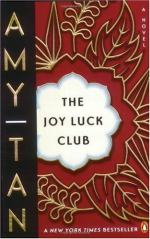|
|
The Joy Luck Club Author/Context
Amy Tan was born in Oakland, California, in 1952, and now lives with her husband, tax lawyer Louis DeMattei, in San Francisco. The Joy Luck Club was her first and perhaps most well known book. It brought her great success and made her name known around the world. The book was made into a movie by director Wayne Wang, which Tan produced and wrote the screenplay for. Tan's other novels include The Kitchen God's Wife, The Bonesetter's Daughter and The Hundred Secret Senses. Much of the content of her books is autobiographical. Tan has said that Kitchen was written after Joy because her mother, Daisy, complained that people thought Suyuan from Joy was based on her. She urged Tan to write the true story of her life. Though much of the book is fictionalized, Kitchen does contain the details of Tan's mother's life: her twelve-year-long bad marriage (she told Amy she might even kill her first husband if she ever saw him again); her life during the war; the children she lost. In her stories, Tan blends Eastern and Western cultures, often by telling a "Chinese" story through "American" eyes, and vice versa.
This practice of combing and contrasting Eastern and Western culture began in Tan's early adulthood, when she reached a breaking point in her relationship with her mother. They had fought throughout her childhood, and Amy was bent on rebelling in whatever way she could. She gradually began to realize that one of their problems was that she did not understand her mother, who desperately wanted to be understood. Tan has said that her mother needed someone to truly listen to her, to relive her life with her. Long conversations with her mother evolved into The Joy Luck Club. Tan created the characters of Rose, Waverly, June and Lena to personify her own questions and concerns. She finally saw that she had to learn about her mother's life in order to understand her own history and personality. The Hundred Secret Senses, another book about two relatives, one American and one Chinese, highlights Tan's confusions about the two cultures she grew up in. It deals with her superstitions and beliefs in the supernatural--she has a friend who predicted his own murder, and after he was killed the names of the two killers came to her out of nowhere. She also has a history of electronic equipment malfunctioning in her presence. Though she accepts these traditionally Chinese otherworldly elements in her life, she also remembers that her mother's superstitions negatively affected Amy and her brother for a long time.
When Amy was fifteen, her father and brother both died of brain tumors. Daisy decided that their house was cursed, and that nine bad things would happen there. She insisted that they move, and they eventually settled in Switzerland, which alternately pleased and enraged Amy. She and her husband have decided not to have children because Amy remembers her childhood as very unhappy, and cannot be sure she would not make the same mistakes her mother made. In fact, Daisy's influence over Amy, both positive and negative, continued until Daisy died. Though Daisy, like Suyuan, had always had ambitions for Amy, and tried to dismiss her interest in storytelling, once Amy became a successful writer, Daisy took credit for her daughter's achievements. Though this is probably unfair to Amy, it is clear that Daisy's life and personality have been providing her daughter with her subject matter, consciously or not: women, both American and Chinese; intersecting and conflicting cultures; and the relationships between mothers and daughters. Tan has often been praised for the universal quality of her themes. As E.D. Huntley says, "It seems fair to predict Tan will have a place in American literary history, not as an ethnic writer, but as an American writer who illuminates brilliantly and sensitively a distinctive and colorful aspect of the American experience."
Bibliography
Huntley, E.D. Amy Tan: A Critical Companion. London: Greenwood Press, 1998
Lyall, Sarah. "At Home with Amy Tan: In the Country of the Spirits." New York Times Book Review, December 28, 1995
Rothstein, Mervyn. "A New Novel by Amy Tan, Who's Still Trying to Adapt to Success." New York Times Book Review, June 11, 1991
Tan, Amy. The Joy Luck Club. New York: G.P. Putnam's Sons, 1989.




